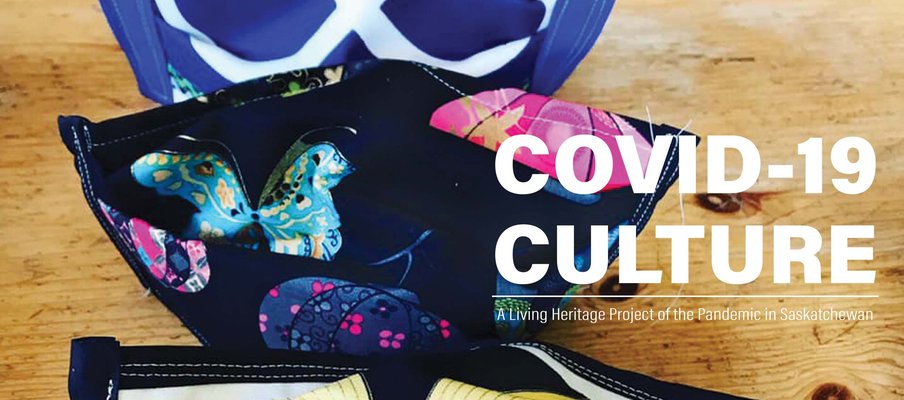Living Through History: Documenting COVID-19 Culture in Saskatchewan

Recognizing that the pandemic would impact people’s lives in different ways, three provincial cultural organizations decided to collect people’s stories as part of an innovative living heritage project. These stories, a snapshot of COVID culture, were compiled into a collection at the end of 2020 that will remain accessible to future generations.
Working with the Provincial Archives of Saskatchewan and Saskatchewan History and Folklore Society, Heritage Saskatchewan took the opportunity to capture the COVID19 experience as part of the province’s living heritage. The timing for this work fit, since the pandemic required most of these organizations to modify their programming to address growing challenges.
According to Kristin Catherwood, Director of Living Heritage, Heritage Saskatchewan, “We saw in March 2020, when life started to change for us all, that we were collectively living through an historic event, and thought it was important to capture people’s initial experiences as close to the beginning of the pandemic as possible,” says Kristin Catherwood. “In essence, we’ve captured stories of the first wave of the pandemic, since as we’re seeing now, this pandemic and its consequences are far from over.”
As COVID19 impacted the province, Heritage Saskatchewan reached out to people across Saskatchewan to document their experiences during the pandemic.
“We contacted six Community Coordinators to collect interviews from communities they belonged to or knew well. It was really important for us to gather stories from demographically and culturally diverse individuals, and to reach as many corners of our vast province as we could,” she explains.
The diversity in stories collected highlighted many of the unique challenges faced by those in different areas of the province. “Depending on where people were in the province, whether in the city or on reserve, or in a rural area, their experiences differed, especially in terms of basic things like access to grocery stores, availability of supplies, access to health services, and so on.”
But despite the differences, many commonalities also came across in the stories that were collected. “Almost everyone spoke about the shock of the sudden changes, and the effects that had on their overall wellbeing,” Catherwood says. “Many spoke about the challenges of loneliness, anxiety, and isolation. Across the board, people remarked that the pandemic forced them to consider what they valued most in life, and that was usually people –family, friends, and community.”
A number of positives began to emerge as more stories were told. “Many people saw benefits in the slowed down pace of life, which made them realize how busy they had been before the pandemic. The pandemic gave many the opportunity to take care of themselves, and to spend more time outside and on favourite hobbies,” she explains.
The collected stories also found a common theme: “We asked questions to see if culture and heritage played a role in helping people cope with the changes brought by the pandemic, and we found this was very much the case.”
According to Catherwood, people turned to cultural practices and their living heritage to help make sense of this event and get through it. “From spiritual practices to traditional food procurement, the pandemic gave people the opportunity to reflect on their values, which are usually sourced from their cultural backgrounds and the living heritage passed down through their families and communities.”
The partners worked together to publish a special edition of their magazine, Folklore, entitled Covid-19 Culture: A Living Heritage Project of the Pandemic in Saskatchewan —and compiled video interviews that are available for streaming on the Provincial Archives of Saskatchewan YouTube page. The magazine is available on on Heritage Saskatchewan's website at heritagesask.ca.
“We want this project to show the importance of ongoing documentation of the firsthand experiences of Saskatchewan people, the relevance of culture and living heritage in our everyday lives, and to provide an example of how communities can coordinate their own documentation projects,” says Catherwood. “We also want to highlight how essential the Provincial Archives are for safeguarding Saskatchewan’s collective memories into posterity.”
Catherwood emphasizes that the project would not have been possible without the work of the six Community Coordinators— Louise BigEagle, Joey Donnelly, Christine Fiddler, Marcel Petit, Pierrette Settee, and Holly Toulejour – who collected the bulk of interviews from Saskatchewan communities.




